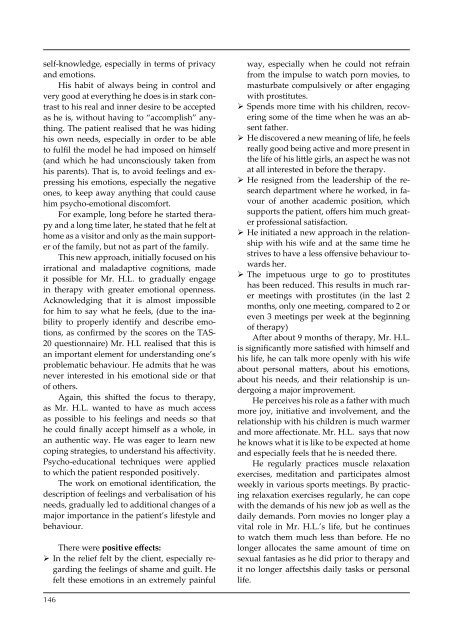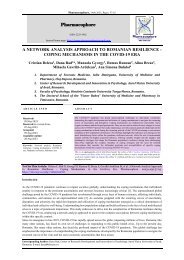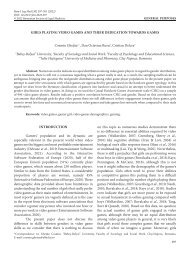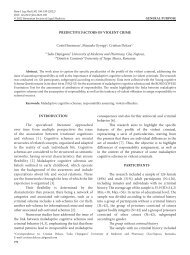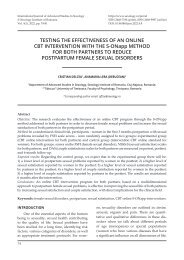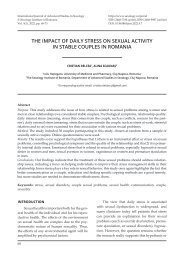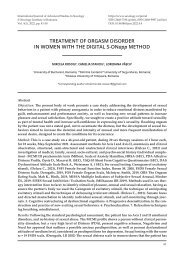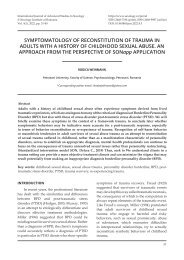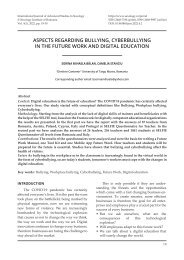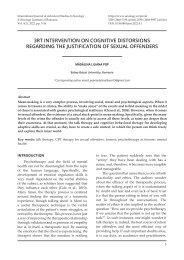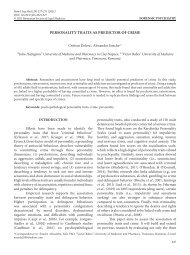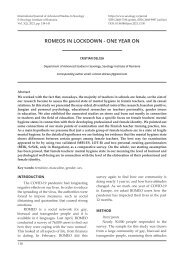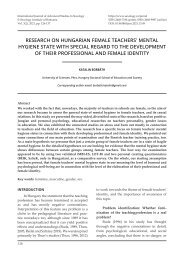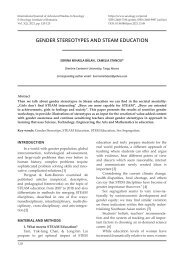Sex as a maladaptive coping mechanism in hypersexuality disorder
The confrontation with the controversial construct of sex addiction reveals not only the heterogeneity of the group of those affected, but also the multitude of aspects that must be taken into account when determining whether this is a singled out, independent disorder or not. Clinical practice experiences also highlight the diversity of relevant influencing factors to consider, as well as the importance of maladaptive coping mechanisms that sustain addiction. The case study presented in this paper was deliberately chosen because clinical cases have repeatedly shown that these two areas, the lack of privacy and the lack of access to their own feelings, play a decisive role in the development of addictions in patients, as well as in the maintenance of this addiction. Therefore, it requires increased attention in therapy.
The confrontation with the controversial construct of sex addiction reveals not only the heterogeneity of the group of those affected, but also the multitude of aspects that must be taken into account when determining whether this is a singled out, independent disorder or not. Clinical practice experiences also highlight the diversity of relevant influencing factors to consider, as well as the importance of maladaptive coping mechanisms that sustain addiction. The case study presented in this paper was deliberately chosen because clinical cases have repeatedly shown that these two areas, the lack of privacy and the lack of access to their own feelings, play a decisive role in the development of addictions in patients, as well as in the maintenance of this addiction. Therefore, it requires increased attention in therapy.
You also want an ePaper? Increase the reach of your titles
YUMPU automatically turns print PDFs into web optimized ePapers that Google loves.
self-knowledge, especially <strong>in</strong> terms of privacy<br />
and emotions.<br />
His habit of always be<strong>in</strong>g <strong>in</strong> control and<br />
very good at everyth<strong>in</strong>g he does is <strong>in</strong> stark contr<strong>as</strong>t<br />
to his real and <strong>in</strong>ner desire to be accepted<br />
<strong>as</strong> he is, without hav<strong>in</strong>g to “accomplish” anyth<strong>in</strong>g.<br />
The patient realised that he w<strong>as</strong> hid<strong>in</strong>g<br />
his own needs, especially <strong>in</strong> order to be able<br />
to fulfil the model he had imposed on himself<br />
(and which he had unconsciously taken from<br />
his parents). That is, to avoid feel<strong>in</strong>gs and express<strong>in</strong>g<br />
his emotions, especially the negative<br />
ones, to keep away anyth<strong>in</strong>g that could cause<br />
him psycho-emotional discomfort.<br />
For example, long before he started therapy<br />
and a long time later, he stated that he felt at<br />
home <strong>as</strong> a visitor and only <strong>as</strong> the ma<strong>in</strong> supporter<br />
of the family, but not <strong>as</strong> part of the family.<br />
This new approach, <strong>in</strong>itially focused on his<br />
irrational and <strong>maladaptive</strong> cognitions, made<br />
it possible for Mr. H.L. to gradually engage<br />
<strong>in</strong> therapy with greater emotional openness.<br />
Acknowledg<strong>in</strong>g that it is almost impossible<br />
for him to say what he feels, (due to the <strong>in</strong>ability<br />
to properly identify and describe emotions,<br />
<strong>as</strong> confirmed by the scores on the TAS-<br />
20 questionnaire) Mr. H.L realised that this is<br />
an important element for understand<strong>in</strong>g one’s<br />
problematic behaviour. He admits that he w<strong>as</strong><br />
never <strong>in</strong>terested <strong>in</strong> his emotional side or that<br />
of others.<br />
Aga<strong>in</strong>, this shifted the focus to therapy,<br />
<strong>as</strong> Mr. H.L. wanted to have <strong>as</strong> much access<br />
<strong>as</strong> possible to his feel<strong>in</strong>gs and needs so that<br />
he could f<strong>in</strong>ally accept himself <strong>as</strong> a whole, <strong>in</strong><br />
an authentic way. He w<strong>as</strong> eager to learn new<br />
<strong>cop<strong>in</strong>g</strong> strategies, to understand his affectivity.<br />
Psycho-educational techniques were applied<br />
to which the patient responded positively.<br />
The work on emotional identification, the<br />
description of feel<strong>in</strong>gs and verbalisation of his<br />
needs, gradually led to additional changes of a<br />
major importance <strong>in</strong> the patient’s lifestyle and<br />
behaviour.<br />
There were positive effects:<br />
‣ In the relief felt by the client, especially regard<strong>in</strong>g<br />
the feel<strong>in</strong>gs of shame and guilt. He<br />
felt these emotions <strong>in</strong> an extremely pa<strong>in</strong>ful<br />
way, especially when he could not refra<strong>in</strong><br />
from the impulse to watch porn movies, to<br />
m<strong>as</strong>turbate compulsively or after engag<strong>in</strong>g<br />
with prostitutes.<br />
‣ Spends more time with his children, recover<strong>in</strong>g<br />
some of the time when he w<strong>as</strong> an absent<br />
father.<br />
‣ He discovered a new mean<strong>in</strong>g of life, he feels<br />
really good be<strong>in</strong>g active and more present <strong>in</strong><br />
the life of his little girls, an <strong>as</strong>pect he w<strong>as</strong> not<br />
at all <strong>in</strong>terested <strong>in</strong> before the therapy.<br />
‣ He resigned from the leadership of the research<br />
department where he worked, <strong>in</strong> favour<br />
of another academic position, which<br />
supports the patient, offers him much greater<br />
professional satisfaction.<br />
‣ He <strong>in</strong>itiated a new approach <strong>in</strong> the relationship<br />
with his wife and at the same time he<br />
strives to have a less offensive behaviour towards<br />
her.<br />
‣ The impetuous urge to go to prostitutes<br />
h<strong>as</strong> been reduced. This results <strong>in</strong> much rarer<br />
meet<strong>in</strong>gs with prostitutes (<strong>in</strong> the l<strong>as</strong>t 2<br />
months, only one meet<strong>in</strong>g, compared to 2 or<br />
even 3 meet<strong>in</strong>gs per week at the beg<strong>in</strong>n<strong>in</strong>g<br />
of therapy)<br />
After about 9 months of therapy, Mr. H.L.<br />
is significantly more satisfied with himself and<br />
his life, he can talk more openly with his wife<br />
about personal matters, about his emotions,<br />
about his needs, and their relationship is undergo<strong>in</strong>g<br />
a major improvement.<br />
He perceives his role <strong>as</strong> a father with much<br />
more joy, <strong>in</strong>itiative and <strong>in</strong>volvement, and the<br />
relationship with his children is much warmer<br />
and more affectionate. Mr. H.L. says that now<br />
he knows what it is like to be expected at home<br />
and especially feels that he is needed there.<br />
He regularly practices muscle relaxation<br />
exercises, meditation and participates almost<br />
weekly <strong>in</strong> various sports meet<strong>in</strong>gs. By practic<strong>in</strong>g<br />
relaxation exercises regularly, he can cope<br />
with the demands of his new job <strong>as</strong> well <strong>as</strong> the<br />
daily demands. Porn movies no longer play a<br />
vital role <strong>in</strong> Mr. H.L.’s life, but he cont<strong>in</strong>ues<br />
to watch them much less than before. He no<br />
longer allocates the same amount of time on<br />
sexual fant<strong>as</strong>ies <strong>as</strong> he did prior to therapy and<br />
it no longer affectshis daily t<strong>as</strong>ks or personal<br />
life.<br />
146


